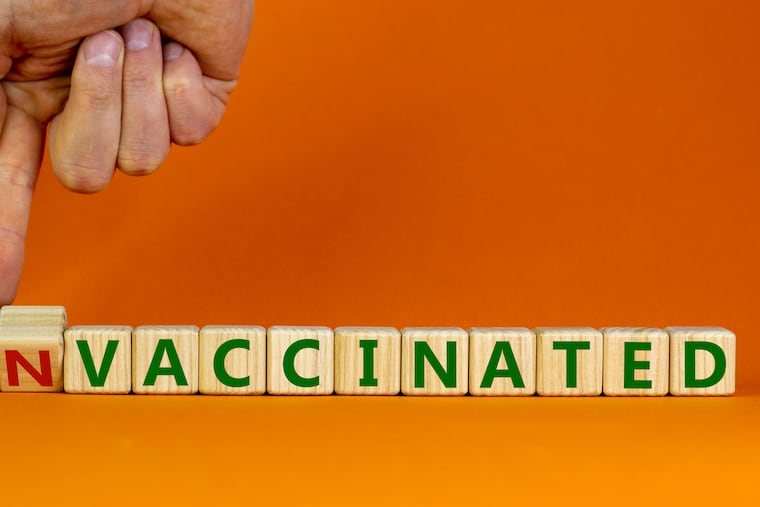Calling people ‘the unvaccinated’ could be a deadly shift in language | The Angry Grammarian
That subtle shift from adjective to noun — what nerds call nominalization — affects how vaccinated people view the unvaccinated, and how the unvaccinated view themselves.

Look up the noun unvaccinated in the dictionary. You won’t find it.
Unvaccinated, the adjective? Sure. But the pandemic has caused language to leap so quickly that we can almost observe it changing in real time.
This summer we’ve seen the explosion of unvaccinated as a noun, as in, “a pandemic of the unvaccinated.” The NOW (News on the Web) Corpus tracks 13.3 billion words of data from web-based newspapers and magazines from 2010 to yesterday, and while usage of the single word unvaccinated has unsurprisingly jumped more than fourfold from May to August 2021, the phrase the unvaccinated has exploded almost eightfold at the same time.
Even if the corpus can’t identify parts of speech, the addition of the article the indicates that, across our language, people are referring less to “vaccinated people” and more to “the unvaccinated.” That subtle shift from adjective to noun — what nerds call nominalization — affects how vaccinated people view the unvaccinated, and how the unvaccinated view themselves. Its implications are deadly.
» READ MORE: 6ABC's Adam Joseph and his kids got COVID-19 from an unvaccinated relative
This change moves away from person-first language and identity-first language, both of which have gained currency in recent years. Unpacking some offensive, outdated language to show how terminology has evolved: If old-fashioned language referred to the disabled or the handicapped, person-first language would use person with a disability; identity-first language would use disabled person. Because people often prefer that such a descriptor not define them, this reframing emphasizes one’s humanity.
Dictionaries differ on whether to include the noun definitions of such identities. For example, the Oxford English Dictionary contains both noun and adjective definitions for disabled and insane, but Merriam-Webster calls both just adjectives. Both dictionaries still include nouns that we now consider offensive, like cripple and invalid.
Both consider unvaccinated to be just an adjective — for now.
Person-first language can relate to any descriptor: disease (AIDS patient vs. person with AIDS), religion (a Muslim vs. person who practices Islam), status (the homeless vs. person who suffers from homelessness vs. homeless person), even bad music taste (Deadhead vs. Grateful Dead fan vs. person who likes to get high at Grateful Dead shows). Some deride person-first language for its wordiness, but words have a different meaning if you say, “She is a Jew” vs. “She is Jewish” vs. “She is a person of the Jewish faith.” Person-first language thrives because it centers a person’s humanity.
On the flipside, referring to the unvaccinated is a subconscious dehumanization. It’s easier for vaccinated people to judge the unvaccinated than vaccine-resistant people. When that language shift happens, walls between the vaccinated and the unvaccinated harden.
» READ MORE: In Philly’s least-vaccinated zip codes, fighting the delta variant is a game of catch-up
But this shift also affects how the so-called unvaccinated view themselves. Referring to the unvaccinated as a group can make them feel, well, like part of a group. Nominalization of the unvaccinated takes a personal choice — the decision not to get a shot — and makes it seem like an innate characteristic. In a desire to be part of this tribe, unvaccinated becomes not just a choice someone made but a definition of who they are. This is true of the dumbest examples — being a person who likes the Grateful Dead implies less than being a Deadhead — but also of life-and-death matters.
Will vaccinations outpace unvaccinated’s long, strange trip toward a noun definition in the dictionary? Don’t get your hopes up: Both Merriam-Webster and the Oxford English Dictionary contain definitions for the noun Deadhead, which means person-first language still has a long way to go.
The Angry Grammarian, otherwise known as Jeffrey Barg, looks at how language, grammar, and punctuation shape our world, and appears biweekly. Send comments, questions, and demonyms to jeff@theangrygrammarian.com.
Read more from The Angry Grammarian
How the right stole ‘woke’ and turned it into a derisive insult